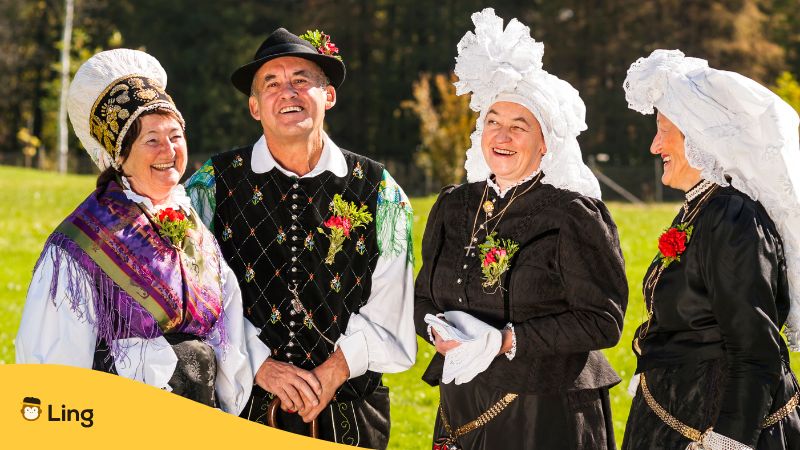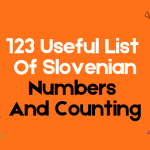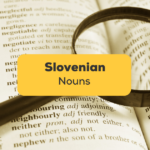In Slovenia, Slovenian idioms (idiomi or frazemi) are an essential component of culture-to-communication. In many languages, idioms and proverbs are traditional, simple sayings that help us convey an idea. They’re figurative, so their literal meanings are not meant to be taken at face value. Usually catchy, rhyming, and sometimes wacky, think of these as splashes of color that brighten up your speech through clever meaning that you have to read between the lines to understand.
There are tons of Slovenian idioms that Slovenes use to paint pictures with their words. By making the effort to learn these using these in your conversations, you can easily use these as conversational tools to blend in with the locals.
Read on to discover the meanings and fun ways to say some popular idioms, and we’ll even learn some Slovenian proverbs, too!
Slovenian Idioms
Idioms and proverbs share an overlap in that they both serve as ways to communicate something in a creative sense, but a proverb is mostly used as a nugget of advice. A proverb can sometimes be an idiom, but an idiom is not always a proverb. Now, let’s expand a little more on Slovenian idioms.
In fact, you probably know some idioms yourself. Have you ever asked someone what the weather is like and they reply that it’s raining cats and dogs? Or is someone aware that you know a juicy secret and tells you to spill the beans? Or maybe you’ve just tragically dropped your yummy ice cream on the ground and heard someone tell you to not cry over spilled milk. Those are all idioms!

To Get Put On The Shoe – Dali So Ga Na Čevelj
Pronunciation: Dah-lee son gah nah che-vehl-yeh
Literal translation: To get put on the shoe. Meaning: A saying you tell to someone who is about to get fired from a job. Why? Because you are prompted to put on shoes when you’re about to go out, in this case, go out into the streets because you just got put out of a job.
Let The Mother Hen Kick You – Naj Te Koklja Brcne
Pronunciation: Najh teh koke-lyah burr-kneh
Literal translation: Let the mother hen kick you. Meaning: To reject something angrily. Why? In Slovenian idioms, sometimes there are polite versions used as a way to swear. Similar to the English “Go to hell” sentiment, that’s exactly what this one does. By wishing for a hen to give the disrespectful person a hefty kick, you can communicate this in a…nicer way? Hopefully, you won’t ever have to use this seriously!
Slow Goes A Long Way – Počasi Se Daleč Pride
Pronunciation: Poh-cha-see seh dah-lech pree-deh
Literal translation: Slow goes a long way. Meaning: Just like the English saying, “Slow and steady wins the race” the Slovenian version of this expression means the same thing, encouraging people to not rush the process.
Everything Looks Worse At First – Kot Se Skuha
Pronunciation: Coat seh skoo-ah
Literal translation: Everything looks worse at first, relative to how it turns out in the end. Meaning: Nothing is ever as bad as it seems. Why? Sometimes people just need a little uplifting advice to get them through a difficult situation, so this saying is used for just that. Keep pushing through, especially all of you language learners out there!
Home Sweet Home – Ljubo Doma Kdor Ga Ima
Pronunciation: Lyoo-bow dough-mah key-door gah ee-mah
Literal translation: Beloved home, whoever has it. Meaning: Home sweet home. Why? After a long time of being away from home, perhaps all you need is a way to express the fact that you missed the cozy atmosphere of your own space. Maybe you can flex one of the Slovenian idioms in your brain and say this after you get back from a vacation to Slovenia?
Where Two Quarrel, the Third Profits – Kjer Se Prepirata Dva, Tretji Dobiček Ima
Pronunciation: Key-err seh prepee-rah-tah dee-vah, trr-etyi dough-bee-check ee-mah
Literal translation: Where two people argue, the third one will get the prize. Meaning: If two people are fighting over something, it’s likely that the third person will manage to be the one to solve the problem first by using a clear head or will take the “prize” the others are fighting over. Why? To remind you that it is always worthwhile to tackle situations with a calm demeanor.
To Go Whistling To The Crabs – Iti Rakom Žvižgat
Pronunciation: E.T. rah-kohm, zh-veezh-gaht
Literal translation: To go whistling to the crabs. Meaning: To die or for something to go wrong. Why? My take on this strange pairing of words is that it signifies a long journey to the sea specifically where crabs hang out on the ocean floor, which is definitely not a place where you want to find yourself. Yikes!
Strike Iron While It’s Hot – Kuj Železo Dokler Je Vroče
Pronunciation: Kooj zheh-lehzo doke-lehr jeh vroh-cheh
Literal translation: If you don’t strike while the iron is hot, it’ll pass you by. Meaning: Just like the English expression, this one expresses the need to take advantage of a situation while it is right in front of you. Another way to say this in English is to grab the bull by the horns!
No labor, No food – Ni Dela, Ni Jela
Pronunciation: Knee deh-lah, neeh gel-ah
Literal translation: No labor, no food. Meaning: Without hard work and/or making a worthy effort, you cannot expect to receive success. Why? This phrase’s meaning can span across cultures and is one of the easier ones to remember due to its handy rhyme scheme. This would be a great mantra to repeat to yourself if you encounter struggles while learning a new language! Remember to practice and your effort will soon pay off.
To Serve Two Masters Is Impossible – Dvema Gospodarjema Ne Moreš Služiti
Pronunciation: Dee-vema gohs-pohdar-yemah neh mores sloozh-ee-tee
Literal translation: To serve two masters is impossible. Meaning: You must contain your loyalties to one person/party, or your loyalties must be unwavering. Why? A saying meant to show how important it is to keep friendship close to your chest as you might be tested one day. While a little dramatic, perhaps you can use this while playing an intense video game and wish to tell another player to have some mercy before they betray you and deliver a devastating final blow to win!
A Promise Makes A Debt – Obljuba Dela Dolg
Pronunciation: Ohb-lyoo-bah deh-lah doughlg
Literal translation: A promise makes a debt. Meaning: Exactly what it means. Why? Apart from being advice to live life, Slovenian idioms can also serve as warnings. This idiom in particular is said to those that make promises, emphasizing that they are double-edged swords if you don’t keep your word because someone might want to collect a type of “debt” on the promise you failed to keep.

Slovenian Proverbs
Now that we’ve compiled a bunch of Slovenian idioms for you to memorize, here are some Slovenian proverbs to add into your mix! Check out the list below for the most popular ones you might hear spoken by Slovenes in or away from Slovenia.
Kamna, ki se obrača, se ne prime mah (Kahma, key seh oh-bracha, seh neh pree-meh mah) – A rolling stone gathers no moss. Meaning: A person who moves around a lot will not gather wealth.
Kjer je dim, je tudi ogenj (Key-err jeh deem, yeh too-dee oh-genjee) – There is no smoke without fire. Meaning: Nothing happens without a reason.
Osel gre samo enkrat na led (Oh-sell greh sahmo ehn-kraht nah led) – Only a fool would make the same mistake twice. Meaning: Learn from your mistakes and improve upon them so as to not appear foolish for repeating the same action and failing again.
Lepa beseda lepo mesto najde (Leh-pah bess-eda leh-poh mess-toe nah-yee-deh) – Politeness costs nothing, but yields much. Meaning: Being polite is easy and doesn’t cost you a thing, so be mindful of that since it can bring you and the people around you the gift of happiness.
Learn Slovenian With Ling
If you’ve made it to the end of this post, then you surely are now equipped with a bunch of fun expressions that are ready for a conversation in Slovenian! The native Slovene speakers you know will definitely be impressed with your idiom knowledge if you keep these crafty sayings in your back pocket.
But if you don’t want to stop here, you should check out the Ling app to learn more about the Slovenian language through nifty lessons where you can practice vocabulary, grammar, and sentence structure in a fun an easy way.



































































